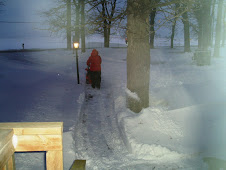Born, November 24, 1868, into a musical family of railway laborers in Northeast Texas, Joplin grew up in Texarkana where he formed a vocal quartet, and taught mandolin and guitar. He was the 2nd of 6 children born to Giles Joplin, an ex-slave from North Carolina, and Florence Givens, a freeborn African-American woman from Kentucky. Scott Joplin's father had played the violin for plantation parties in North Carolina, and his mother sang and played the banjo.
There were few opportunities for black pianists other than churches and brothels. During the late 1880s he left his job as a laborer with the railroad, and traveled the South as an itinerant musician.
Joplin moved to Sedalia, Missouri, in 1894 and earned a living as a piano teacher. Joplin began publishing music in 1895, and publication of his "Maple Leaf Rag" in 1899 brought him fame. "Maple Leaf Rag", became ragtime's first and most influential hit and influenced subsequent writers of ragtime. It also brought the composer a steady income for life, though Joplin did not reach this level of success again and frequently had financial problems.
He went to Chicago for the World's Fair of 1893, which played a major part in making ragtime a national craze by 1897.
In 1901 Joplin moved to St. Louis and continued to compose and publish music, and regularly performed in the St. Louis community. The score to his first opera "A Guest of Honor" was confiscated in 1903 with his belongings because of a non-payment of bills, and is now considered lost.
He continued to compose and publish music, and in 1907 moved to New York City to find a producer for a new opera without much monetary success. His second opera, "Treemonisha," was not received well at its performance in 1915.
By 1916 Joplin was suffering dementia as a result of syphilis. He was admitted to a mental institution in January 1917, and died there 3 months later at the age of 49.
Joplin's death is widely considered to mark the end of ragtime as, over the next few years, it evolved with other styles into stride, jazz, and big band swing. His music was rediscovered in the early 1970s with the release of a million-selling album by Joshua Rifkin. This was followed by the Academy Award–winning 1973 movie "The Sting" that featured several of his compositions including "The Entertainer".
Dubbed the "King of Ragtime Writers", wrote 44 original ragtime pieces, one ragtime ballet, and 2 operas. The opera "Treemonisha" was finally produced to wide acclaim in 1972. In 1976, Joplin was posthumously awarded a Pulitzer Prize.
Subscribe to:
Post Comments (Atom)
















No comments:
Post a Comment